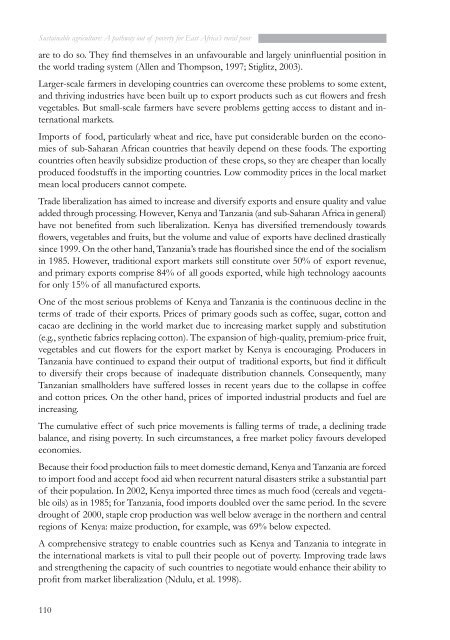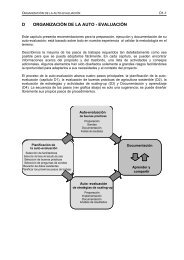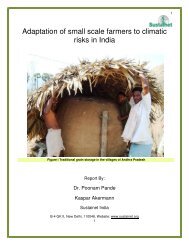cases from tanzania - Sustainet
cases from tanzania - Sustainet
cases from tanzania - Sustainet
Create successful ePaper yourself
Turn your PDF publications into a flip-book with our unique Google optimized e-Paper software.
Sustainable agriculture: A pathway out of poverty for East Africa’s rural poor<br />
are to do so. They find themselves in an unfavourable and largely uninfluential position in<br />
the world trading system (Allen and Thompson, 1997; Stiglitz, 2003).<br />
Larger-scale farmers in developing countries can overcome these problems to some extent,<br />
and thriving industries have been built up to export products such as cut flowers and fresh<br />
vegetables. But small-scale farmers have severe problems getting access to distant and international<br />
markets.<br />
Imports of food, particularly wheat and rice, have put considerable burden on the economies<br />
of sub-Saharan African countries that heavily depend on these foods. The exporting<br />
countries often heavily subsidize production of these crops, so they are cheaper than locally<br />
produced foodstuffs in the importing countries. Low commodity prices in the local market<br />
mean local producers cannot compete.<br />
Trade liberalization has aimed to increase and diversify exports and ensure quality and value<br />
added through processing. However, Kenya and Tanzania (and sub-Saharan Africa in general)<br />
have not benefited <strong>from</strong> such liberalization. Kenya has diversified tremendously towards<br />
flowers, vegetables and fruits, but the volume and value of exports have declined drastically<br />
since 1999. On the other hand, Tanzania’s trade has flourished since the end of the socialism<br />
in 1985. However, traditional export markets still constitute over 50% of export revenue,<br />
and primary exports comprise 84% of all goods exported, while high technology aacounts<br />
for only 15% of all manufactured exports.<br />
One of the most serious problems of Kenya and Tanzania is the continuous decline in the<br />
terms of trade of their exports. Prices of primary goods such as coffee, sugar, cotton and<br />
cacao are declining in the world market due to increasing market supply and substitution<br />
(e.g., synthetic fabrics replacing cotton). The expansion of high-quality, premium-price fruit,<br />
vegetables and cut flowers for the export market by Kenya is encouraging. Producers in<br />
Tanzania have continued to expand their output of traditional exports, but find it difficult<br />
to diversify their crops because of inadequate distribution channels. Consequently, many<br />
Tanzanian smallholders have suffered losses in recent years due to the collapse in coffee<br />
and cotton prices. On the other hand, prices of imported industrial products and fuel are<br />
increasing.<br />
The cumulative effect of such price movements is falling terms of trade, a declining trade<br />
balance, and rising poverty. In such circumstances, a free market policy favours developed<br />
economies.<br />
Because their food production fails to meet domestic demand, Kenya and Tanzania are forced<br />
to import food and accept food aid when recurrent natural disasters strike a substantial part<br />
of their population. In 2002, Kenya imported three times as much food (cereals and vegetable<br />
oils) as in 1985; for Tanzania, food imports doubled over the same period. In the severe<br />
drought of 2000, staple crop production was well below average in the northern and central<br />
regions of Kenya: maize production, for example, was 69% below expected.<br />
A comprehensive strategy to enable countries such as Kenya and Tanzania to integrate in<br />
the international markets is vital to pull their people out of poverty. Improving trade laws<br />
and strengthening the capacity of such countries to negotiate would enhance their ability to<br />
profit <strong>from</strong> market liberalization (Ndulu, et al. 1998).<br />
110




